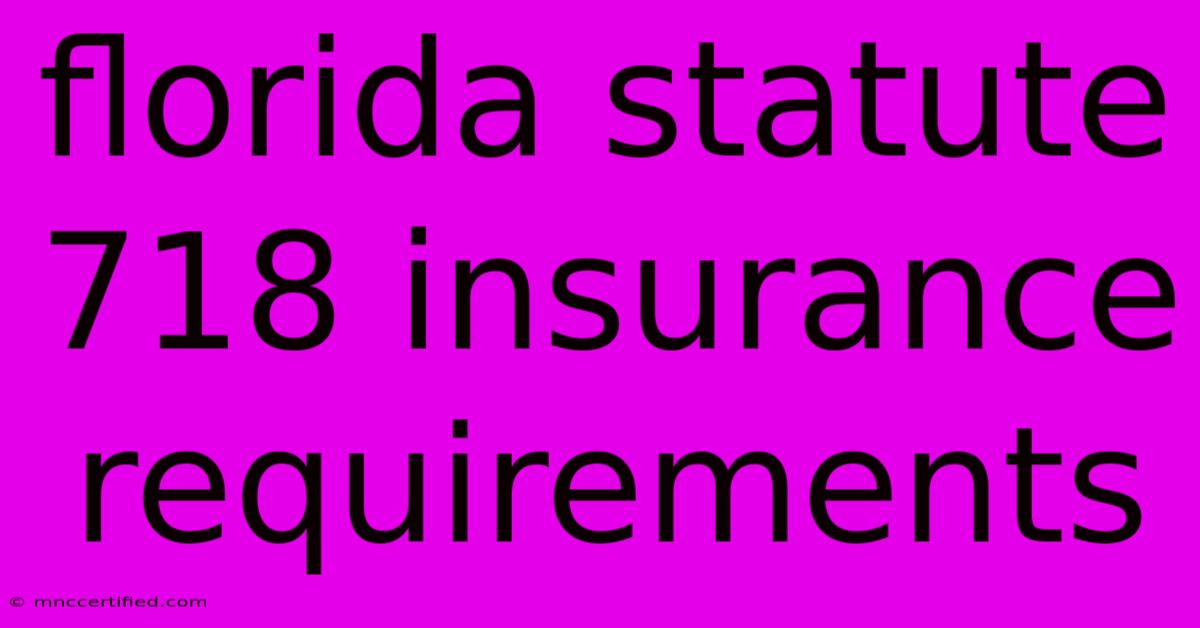Florida Statute 718 Insurance Requirements

Table of Contents
Florida Statute 718: Demystifying Insurance Requirements for Condo and HOA Communities
Florida Statute 718 governs the operations of condominium and homeowner's associations (HOAs) in the state. A crucial aspect of this statute addresses insurance requirements, ensuring the safety and financial security of residents and the community as a whole. Understanding these requirements is essential for both residents and association boards to avoid potential liabilities and maintain a smoothly functioning community.
Key Insurance Coverage Mandated by Florida Statute 718
1. Property Insurance: This is a cornerstone requirement of Florida Statute 718. Condominium associations are mandated to maintain property insurance covering the common areas of the community, including the building structures, amenities, and landscaping. HOAs, on the other hand, are required to obtain insurance for the common areas and, depending on the association's governing documents, may also be responsible for insuring individual units.
2. Liability Insurance: This coverage safeguards the association from financial losses arising from accidents, injuries, or property damage occurring within the community. Florida Statute 718 mandates condominium associations to carry liability insurance covering both the common areas and individual units. HOAs are also obligated to maintain liability insurance, but the specific scope of coverage might vary depending on their governing documents.
3. Fidelity Coverage: This insurance protects the association from financial losses due to employee dishonesty or embezzlement. Condominium and HOA associations must carry fidelity coverage to ensure the financial integrity of their operations.
4. Workers' Compensation: This type of insurance is necessary for associations that employ staff, covering injuries or illnesses incurred by employees while performing their duties. Condominium and HOA associations with employees are obligated to provide workers' compensation insurance.
5. Directors and Officers Liability Insurance (D&O): This insurance safeguards the association's board members from personal liability for claims related to their decisions and actions taken in their official capacities. While not explicitly mandated by Florida Statute 718, D&O insurance is highly recommended for all condominium and HOA associations to protect their board members from potential lawsuits.
Understanding the Importance of Compliance
Failure to meet the insurance requirements outlined in Florida Statute 718 can have serious consequences for both the association and its residents. Non-compliance could lead to:
- Financial penalties: The Florida Department of Business and Professional Regulation (DBPR) can impose fines on associations that fail to meet insurance requirements.
- Legal liability: Without adequate insurance coverage, the association and its board members could be personally liable for damages or losses arising from accidents, injuries, or other incidents.
- Difficulty obtaining financing: Lenders may require proof of insurance compliance before granting loans to the association.
Tips for Ensuring Compliance
- Review your governing documents: Carefully examine the association's declaration of condominium or articles of incorporation to understand specific insurance requirements.
- Consult with an insurance professional: A qualified insurance agent can provide guidance on meeting all applicable Florida Statute 718 insurance requirements.
- Maintain accurate records: Keep detailed records of insurance policies, premiums, and renewals to demonstrate compliance.
- Communicate with residents: Ensure residents are aware of the association's insurance coverage and any changes to policies.
By diligently adhering to Florida Statute 718's insurance requirements, condominium and HOA associations can protect their residents, assets, and financial stability. This proactive approach helps create a secure and well-managed living environment for everyone.

Thank you for visiting our website wich cover about Florida Statute 718 Insurance Requirements. We hope the information provided has been useful to you. Feel free to contact us if you have any questions or need further assistance. See you next time and dont miss to bookmark.
Featured Posts
-
Bof A Airline Stocks Outperform S And P 500
Nov 07, 2024
-
Odegaard Returns To Arsenal Training Gallery
Nov 07, 2024
-
Unheard Whispers Of A Rejected Bond Novel
Nov 07, 2024
-
Do You Need Insurance To Get An Inspection
Nov 07, 2024
-
Estrella Roja Vs Barcelona Champions League Match Goals
Nov 07, 2024